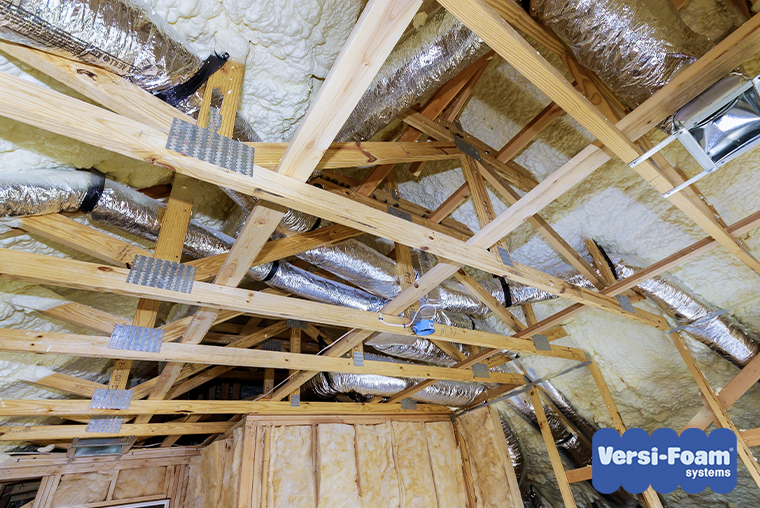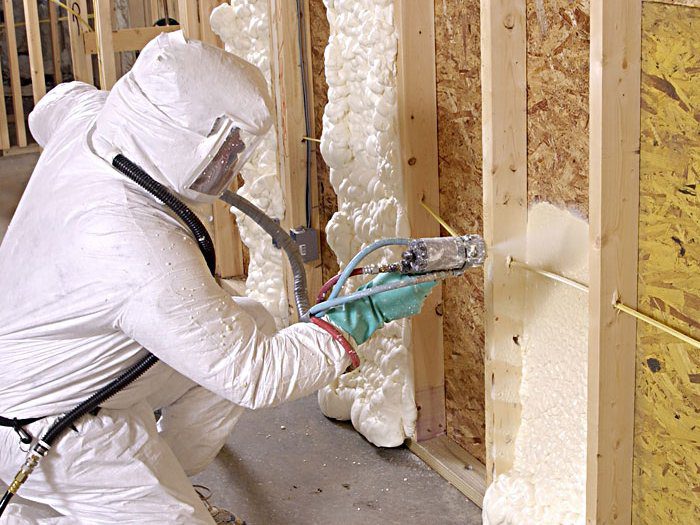Selecting the Right Type of Spray Foam for Your Insulation Demands
Selecting the Right Type of Spray Foam for Your Insulation Demands
Blog Article
Spray Foam: The Ultimate Remedy for Air Sealing and Insulation
Spray foam insulation has actually emerged as a leading option for effective air sealing and thermal insulation, offering a distinct mix of residential properties that set it apart from conventional techniques. Comprehending the full range of its benefits, installment procedures, and contrasts with other insulation kinds is vital for making educated choices.
What Is Spray Foam?
Spray foam is a functional insulation product that combines the concepts of air securing and thermal resistance to boost power effectiveness in structures. Composed primarily of polyurethane or various other similar substances, spray foam is used as a fluid that increases upon call with surface areas, producing a solid, continual layer of insulation. This distinct residential or commercial property enables it to fill spaces, splits, and voids that typical insulation products might ignore, giving a superior air seal.
There are 2 main kinds of spray foam: open-cell and closed-cell. Open-cell spray foam is lighter and much more versatile, offering superb sound absorption and a lower R-value per inch - Spray Foam. In comparison, closed-cell spray foam is denser, providing a higher R-value, dampness resistance, and included architectural honesty to developing elements
The application process usually involves specific tools, ensuring a seamless application that sticks to various substrates, consisting of timber, concrete, and steel. This adaptability makes spray foam suitable for both new constructions and retrofitting existing frameworks. Its capability to produce a closed barrier dramatically contributes to lowering energy intake and enhancing indoor air high quality, thereby making it a favored option among homeowners and contractors alike.
Benefits of Spray Foam Insulation
One of one of the most considerable advantages of spray foam insulation is its extraordinary capability to produce a constant air barrier, which successfully reduces power loss. Unlike conventional insulation materials, spray foam increases to fill up cracks and voids, guaranteeing that air leakage is drastically reduced. This particular not only boosts power efficiency but also leads to lower energy bills gradually.
Additionally, spray foam insulation offers premium thermal resistance, adding to an extra secure indoor setting. Its high R-value per inch permits efficient insulation in confined areas, making it excellent for attic rooms, wall surfaces, and crawl rooms. The moisture-resistant residential properties of spray foam assistance avoid mold and mildew and mildew development, advertising healthier living conditions.
Another important benefit of spray foam insulation is its sound-dampening top qualities (Spray Foam). It properly lowers noise transmission in between rooms, producing a quieter and more comfortable home atmosphere. The resilience of spray foam likewise stands out, as it does not droop or work out in time, preserving its performance throughout its life-span
Just How Spray Foam Functions
Recognizing exactly how spray foam insulation works is crucial for valuing its efficiency in air sealing and thermal resistance. Spray foam insulation is composed of two key components: isocyanate and polyol material. When these components are blended, they undertake a chemical response that creates the material to broaden swiftly, creating a dense foam that fills gaps, cavities, and cracks.
As the foam broadens, my link it follows surface areas, developing an airtight seal that considerably lowers air infiltration. This particular makes spray foam insulation highly effective at avoiding drafts and wetness infiltration, which can result in power loss and damage in time. In addition, the closed-cell variation of spray foam supplies remarkable thermal resistance because of its inflexible framework, efficiently reducing warm transfer.
The unique homes of spray foam enable it to adhere to irregular surfaces, ensuring thorough coverage and a seamless barrier. Because of this, spray foam insulation not only enhances energy performance but also contributes to enhanced indoor air quality by reducing the buildup of pollutants and allergens. Inevitably, understanding the auto mechanics behind spray foam highlights its function as a superior choice for insulation and air sealing in both residential and business applications.
Setup Process Overview

Prior to installment, the area has to be sufficiently cleaned up and prepped, making sure that surface areas are complimentary from moisture, particles, and dust. Since pollutants can endanger bond and overall performance, this action is critical. When the area is prepared, the application entails blending both components of the spray foam, which broadens upon get in touch with and fills up gaps successfully.
Trained specialists must conduct the installment, utilizing specific tools to make sure uniform protection and optimum density. Security safety measures, consisting of wearing protective gear and making certain appropriate air flow, are essential during this process. After application, the foam commonly cures swiftly, creating a strong barrier that enhances energy performance.
Contrasting Spray Foam to Conventional Insulation
When examining insulation choices, spray foam insulation stands apart in contrast to traditional materials such as fiberglass and cellulose. One of the main benefits of spray foam is its exceptional air sealing capabilities. Unlike fiberglass and cellulose, which can permit air infiltration, spray foam broadens upon application, filling up gaps and gaps to produce a closed seal. This causes boosted power performance, as much less heated or cooled air gets away the home, bring about reduced utility costs.
Additionally, spray foam gives a higher R-value per inch than conventional insulation kinds, using more efficient thermal resistance in a thinner profile. This particular is particularly advantageous precede with minimal cavity depth. Spray foam is immune to dampness and mold and mildew development, which her explanation can be a significant concern with cellulose and fiberglass, especially in damp atmospheres.
However, spray foam insulation commonly brings a greater in advance expense than its standard equivalents. Homeowners should weigh this preliminary financial investment versus lasting energy cost click here for info savings and efficiency advantages. Eventually, while both insulation kinds offer their purpose, spray foam arises as an advanced solution for modern-day insulation demands, particularly in terms of air securing and thermal effectiveness.

Verdict
In summary, spray foam insulation stands for a very efficient option for achieving optimum air securing and thermal resistance. Its special residential properties, consisting of moisture resistance and sound dampening, make it appropriate for numerous applications in both brand-new constructions and retrofitting projects (Spray Foam). Although the initial prices might be higher contrasted to traditional insulation materials, the long-lasting advantages, such as significant power cost savings and improved indoor air quality, warrant the financial investment and highlight its value in modern building practices.
Spray foam insulation has emerged as a leading service for effective air sealing and thermal insulation, providing a distinct combination of residential or commercial properties that establish it apart from typical methods.Spray foam is a flexible insulation product that integrates the concepts of air sealing and thermal resistance to boost power performance in buildings.When assessing insulation choices, spray foam insulation stands out in contrast to traditional products such as fiberglass and cellulose. Inevitably, while both insulation kinds serve their function, spray foam arises as an extra innovative option for contemporary insulation needs, especially in terms of air sealing and thermal performance.
In recap, spray foam insulation stands for an extremely effective service for accomplishing optimum air sealing and thermal resistance.
Report this page